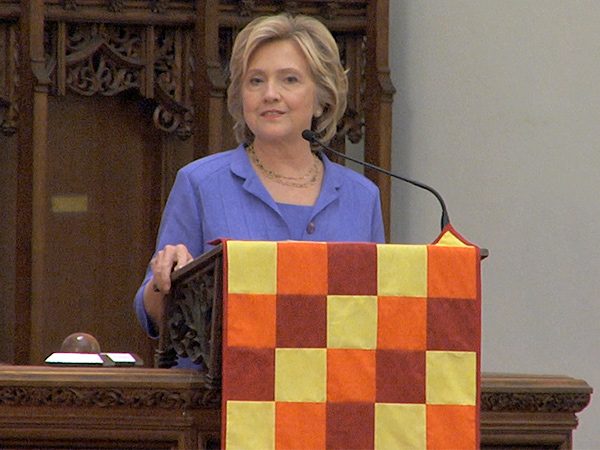 HILLARY CLINTON in speech: I am a Methodist both by birth and by choice.
HILLARY CLINTON in speech: I am a Methodist both by birth and by choice.
KIM LAWTON, correspondent: According to those who know her, Hillary Clinton has been profoundly shaped by her lifelong affiliation with the United Methodist Church.
LAWTON: Burns Strider is Clinton’s longtime spiritual adviser.
BURNS STRIDER: Methodism is very important to understand her.
LAWTON: Clinton comes from generations of Methodists. Growing up, her family attended First United Methodist Church in Park Ridge, Illinois.
PROF. CAROLYN DAVIS, Wesley Theological Seminary: While the church itself was a relatively traditional mainline church, her youth minister was incredibly involved in what we call the social justice social gospel movement within the United Methodist Church and other mainline Protestant traditions at the time.
LAWTON: Clinton often recalls the time her church youth group went to hear Martin Luther King, Jr preach.
CLINTON in speech: His words, the power of his example, affected me deeply and added to the lessons of my minister to face the world as it is, not as we might want it to be but to commit ourselves to turning it into what it should be.
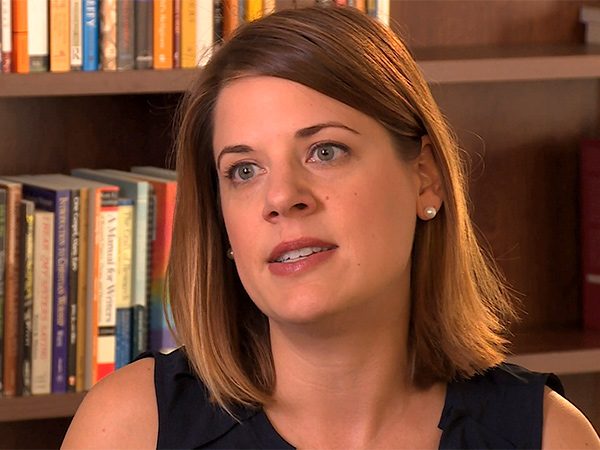 LAWTON: Carolyn Davis is Deputy Director of Wesley Theological Seminary’s Center for Public Theology.
LAWTON: Carolyn Davis is Deputy Director of Wesley Theological Seminary’s Center for Public Theology.
DAVIS: So Hillary Clinton in her relationship with that youth minister was really introduced to the idea that faith formation is deeply linked to public service, to social justice.
LAWTON: In her acceptance speech for the Democratic nomination, Clinton quoted a well-known Methodist credo, one that she repeats frequently:
CLINTON in speech: “Do all the good you can, for all the people you can, in all the ways you can, as long as ever you can.”
CLINTON in speech: I’ve come to see how important it is that we always be asking ourselves how we do translate our faith into actions.
LAWTON: Clinton translates her faith at the liberal end of the Protestant theological spectrum. Many religious conservatives, including some in her own denomination, criticize her strong and unapologetic support for abortion rights and same-sex marriage. But Clinton also speaks of her personal spirituality.
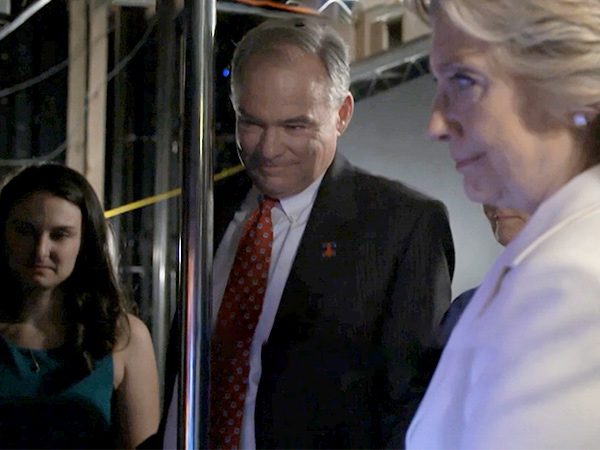 CLINTON in speech: I am grateful for the gift of personal salvation and for the great obligation of the social gospel to use the gift of grace wisely, to reflect the love of God and follow the example of Jesus Christ to the greater good of God’s beloved community.
CLINTON in speech: I am grateful for the gift of personal salvation and for the great obligation of the social gospel to use the gift of grace wisely, to reflect the love of God and follow the example of Jesus Christ to the greater good of God’s beloved community.
LAWTON: After her Democratic convention speech, Clinton’s campaign Tweeted a video of her with running mate Tim Kaine and their families praying together. Her friends say prayer is very important to her.
STRIDER: She has an active prayer circle, a small group that she prays with and they pray for her.
LAWTON: And Clinton says her faith has helped her through some difficult times.
CLINTON in speech: I’ve made my share of mistakes. I don’t know anyone who hasn’t. Everyone here today has stumbled on their own stony paths. It’s grace that lifts us up and grace that leads us home.
DONALD TRUMP in speech: I believe in God. I believe in the Bible. I’m a Christian.
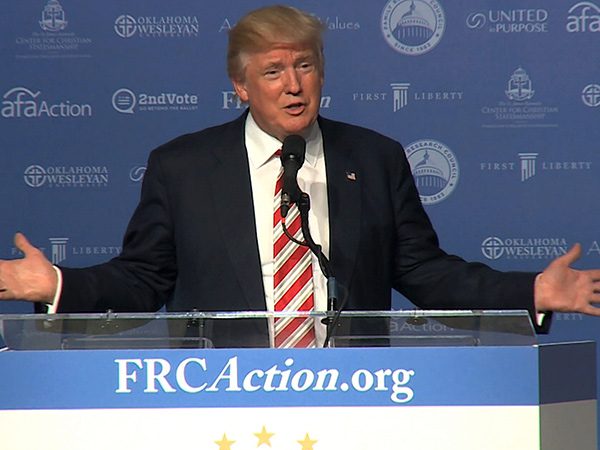 LAWTON: Donald Trump identifies himself as a Presbyterian. He was confirmed at First Presbyterian Church in Jamaica, NY. For much of his youth, his family regularly attended Marble Collegiate Church in Manhattan, affiliated with the Reformed Church in America and one of the nation’s oldest Protestant congregations. Trump and his first wife were married there, although he is not currently an active member. From 1932 until 1984, Marble Collegiate was led by prominent pastor and best-selling author Norman Vincent Peale, who was best known for preaching about the “Power of Positive Thinking.”
LAWTON: Donald Trump identifies himself as a Presbyterian. He was confirmed at First Presbyterian Church in Jamaica, NY. For much of his youth, his family regularly attended Marble Collegiate Church in Manhattan, affiliated with the Reformed Church in America and one of the nation’s oldest Protestant congregations. Trump and his first wife were married there, although he is not currently an active member. From 1932 until 1984, Marble Collegiate was led by prominent pastor and best-selling author Norman Vincent Peale, who was best known for preaching about the “Power of Positive Thinking.”
REV. NORMAN VINCENT PEALE: Now, what I want to talk to you about tonight is why positive thinkers get positive results.
LAWTON: Trump has said several times that his many successes were achieved through such “positive thinking.” Many observers also say Trump’s affinity for this philosophy can be seen in his relationships with several high profile “prosperity gospel” preachers. Trump does not appear to be comfortable speaking about faith on the campaign trail. He was famously mocked for calling a book of the Bible “Two Corinthians” rather than the more commonly used, “Second Corinthians.”
PROF. STEPHEN SCHNECK, Catholic University of America: Referring to “Two Corinthians: for example and similar things were just an indication that this isn’t a churchy individual at all. His faith is more in the background than that, it’s not part of his everyday language.
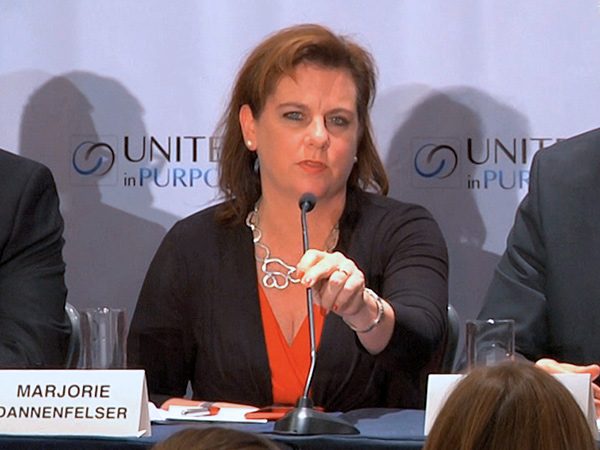 LAWTON: Some people of faith who have met with Trump say it would be wrong to consider him a non-believer. Marjorie Dannenfelser, who is Catholic, heads Trump’s prolife advisory council.
LAWTON: Some people of faith who have met with Trump say it would be wrong to consider him a non-believer. Marjorie Dannenfelser, who is Catholic, heads Trump’s prolife advisory council.
MARJORIE DANNENFELSER, Susan B. Anthony List: I think he has a budding faith, and I think he’s very curious about the faith. When you notice something about other people that you think ‘What makes that person different? There’s something different and unique, and permanent about that person’s presence.’ And I think that is what I see in him. He’s really drawn to people of faith.
TRUMP in speech: A Trump administration: Our Christian heritage will be cherished, protected, defended like you’ve never seen before.
LAWTON: When speaking to evangelical audiences, Trump emphasizes issues, rather than faith. He talks often about religious liberty, and has repeated his intention to repeal the Johnson Amendment, which prohibits tax-exempt houses of worship from endorsing candidates.
TRUMP in speech: That was my idea. I figure it’s the only way I’m getting to heaven, so this is going to be very, the only way.
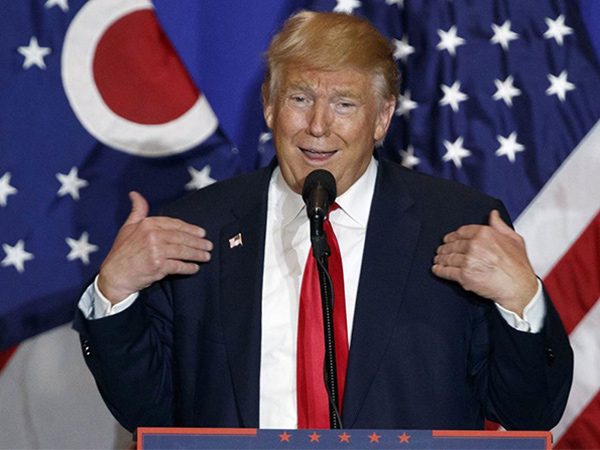 LAWTON: Trump has also appealed to religious conservatives by promising to oppose abortion rights and appoint prolife judges.
LAWTON: Trump has also appealed to religious conservatives by promising to oppose abortion rights and appoint prolife judges.
LAWTON: His stands on those issues have convinced some conservative evangelicals to support him despite his several marriages and comments that many found offensive. Ohio Pastor Frank Amedia has been one of the Trump campaign’s liaisons for Christian policy.
PASTOR FRANK AMEDIA, Touch Heaven Ministries: I’m not going to judge somebody’s Christianity. What I care about is, is that he’s raised himself up for Christian rights, for the First Amendment, for religious rights.
LAWTON: In speaking to religious audiences, Trump sometimes refers to God’s hand being on the nation’s future.
TRUMP in speech: There’s a biblical verse that I have often read, and I want to repeat it again because I think it is so important to what we’re trying to achieve right now for our country. It’s from First John Chapter 4, No one has ever seen God, but if we love one another, God lives in us and His love is made complete in us. So true.
TIM KAINE in interview: For me, my motivation is a spiritual and religious one.
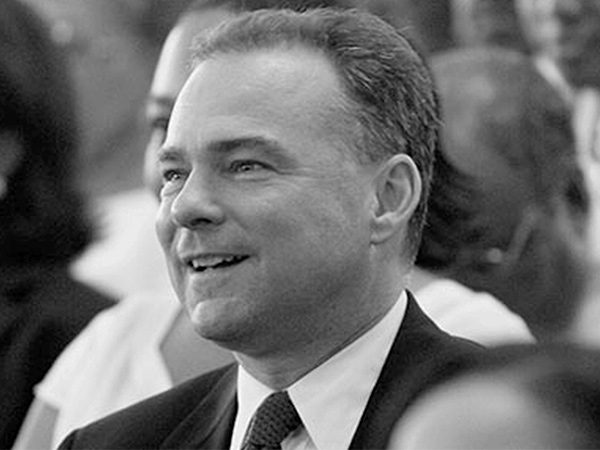 LAWTON: Tim Kaine’s Roman Catholic faith has played a major role throughout his life. He grew up in a Midwestern middle-class family and attended Catholic schools.
LAWTON: Tim Kaine’s Roman Catholic faith has played a major role throughout his life. He grew up in a Midwestern middle-class family and attended Catholic schools.
KAINE in speech: I had gone through college and law school and kind of drifted away from church-going and you know, was in the more questioning and rebellious phase of adolescent malehood.
LAWTON: Then, he says, at Harvard Law School, he reached a point where he didn’t know what he wanted to do with his life. He took a year off and went to work with Jesuit missionaries in Honduras. He frequently discusses the deep impact of that experience, sometimes using both English and Spanish.
KAINE to Latino evangelical leaders: I really learned about the power of faith from my friends in El Progreso, Honduras: faith, family, hard work, basic American values.
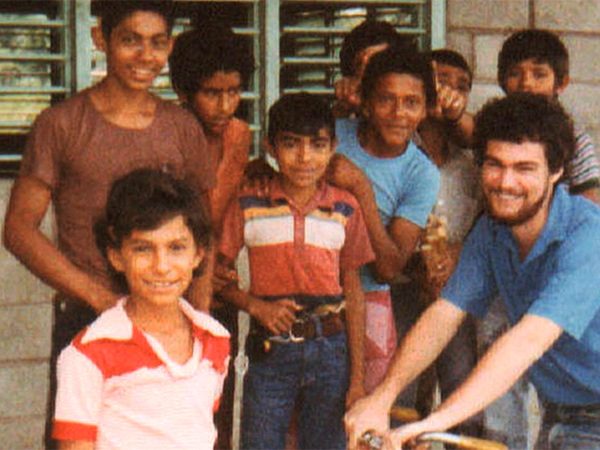 DAVIS: Works among the Jesuit priests, works among the communities they were working with, encounters leaders like Oscar Romero, gets introduced to this idea of liberation theology. Tim Kaine gets to know this ideological idea, that God is on the side of the oppressed first, that the poor, the underserved have God’s preferential love.
DAVIS: Works among the Jesuit priests, works among the communities they were working with, encounters leaders like Oscar Romero, gets introduced to this idea of liberation theology. Tim Kaine gets to know this ideological idea, that God is on the side of the oppressed first, that the poor, the underserved have God’s preferential love.
KAINE in speech: By the time I came back to law school, I was really focused on using my legal career to benefit the least of these.
LAWTON: For more than 30 years, Kaine and his wife have attended a predominantly African-American Catholic Church in Richmond where they were married in 1984. Kaine even sings in the choir.
KAINE in speech: We’re very, very involved in it. It’s a small parish, kind of in the inner city of Richmond, but it’s been a real wonderful faith home.
LAWTON: Kaine ties his political work on poverty and environmental issues directly to his faith. But he has been criticized by some Catholics for taking other political positions that differ with church teachings, particularly in his support for abortion rights.
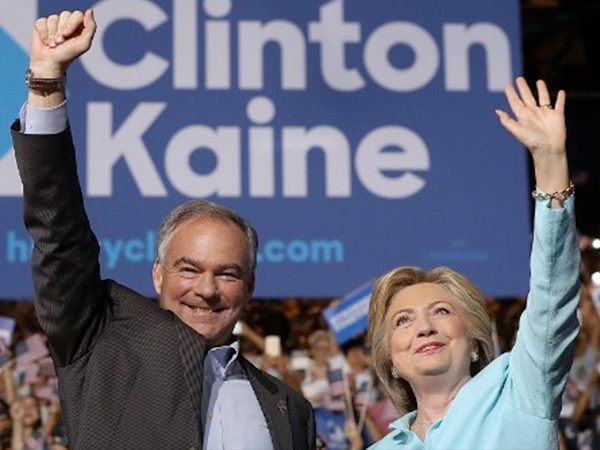 LAWTON: When asked about conflicts between his faith and his politics, he often chooses to highlight his struggle as a governor in allowing executions, something the Catholic Church opposes.
LAWTON: When asked about conflicts between his faith and his politics, he often chooses to highlight his struggle as a governor in allowing executions, something the Catholic Church opposes.
KAINE in speech: I believe in the teachings of my church, but I also know what it is to take an oath to uphold the law. And that upholding oaths is also a virtue, it’s also a moral thing.
LAWTON: On the campaign trail, Kaine speaks frequently and comfortably about his faith. And in a 2012 interview, he told us he urges other Democratic politicians to do the same.
KAINE in interview: We can be inclusive as religious people, without sacrificing any of our sincere beliefs, but we can do it in an inclusive way.
MIKE PENCE in speech: I’m a Christian, a conservative and a Republican…in that order.
LAWTON: Mike Pence grew up in Indiana, in an Irish Catholic Democratic family.
PENCE in speech: Mom and Dad, strong faith. But for me, I found something was missing as I came up. And I went off to college and had largely walked away from the faith I was raised to believe in.
LAWTON: At college, he got involved with a nondenominational Christian fellowship group.
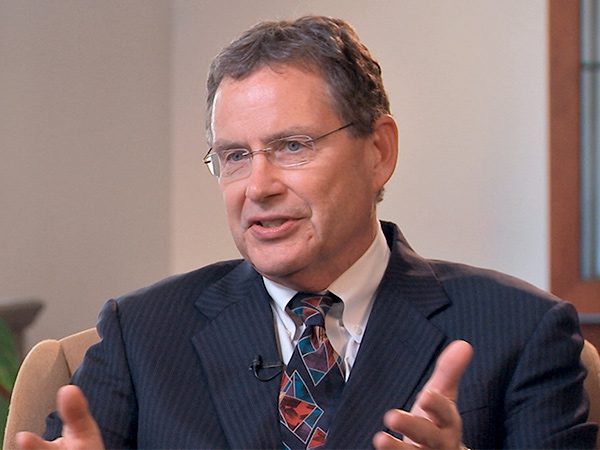 PENCE in speech: I went to a Christian music festival and I heard one preacher after another not talk to me so much about what Jesus has done to save the world, but that what Jesus had done, he’d done for me. And my heart broke with gratitude and I gave my life to Jesus Christ, and it’s made all the difference.
PENCE in speech: I went to a Christian music festival and I heard one preacher after another not talk to me so much about what Jesus has done to save the world, but that what Jesus had done, he’d done for me. And my heart broke with gratitude and I gave my life to Jesus Christ, and it’s made all the difference.
SCHNECK: He found there, I think, a different kind of spirituality, a spirituality that sees a much more direct connection between the individual and Jesus and that really has been a fundamentally important part of his development, not just as an individual but as a politician.
LAWTON: Although Pence has referred to himself as an “evangelical Catholic”, in recent years, he has solely attended a series of evangelical Protestant churches.
DANNENFELSER: Faith is in his DNA, it’s who he is, it’s a natural extension of everything he’s about. It informs his life choices, it informs his policy decisions. He and Karen pray before every major decision when it comes to politics, including whether to be the VP nominee or not.
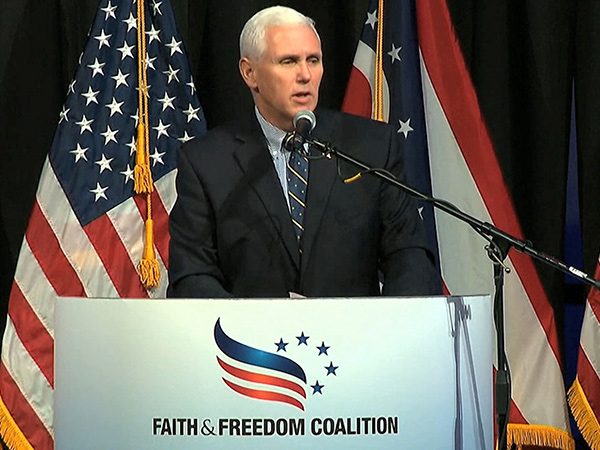 LAWTON: Like Clinton and Kaine, Pence talks often about putting faith into action.
LAWTON: Like Clinton and Kaine, Pence talks often about putting faith into action.
PENCE in speech: Your presence here today demonstrates that you are committed to putting feet on our values, feet on our faith.
LAWTON: For Pence, faith has translated into conservative policy positions, such as his firm opposition to same-sex marriage and abortion.
PENCE in speech: I long to see the day that Roe versus Wade is sent to the ash heap of history where it belongs.
LAWTON: As governor of Indiana, Pence signed a controversial bill that he said protected religious liberty. The bill was supported by conservative evangelicals but opposed by others in the faith community who said it expanded discrimination against LGBT people.
DAVIS: Mike Pence has been deeply formed in the evangelical tradition, particularly the strains of evangelicalism that has sought to put into public policy reflections of the values of the conservative evangelical right.
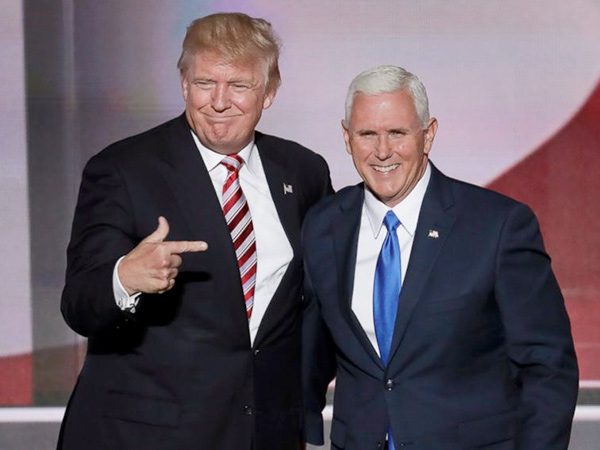 LAWTON: Pence’s position on the Republican ticket has reassured some white evangelicals and conservative Catholics who had reservations about Trump. Many of them agree with Pence’s view that God has extended special grace to America.
LAWTON: Pence’s position on the Republican ticket has reassured some white evangelicals and conservative Catholics who had reservations about Trump. Many of them agree with Pence’s view that God has extended special grace to America.
PENCE in speech: In these troubled times at home and abroad, these challenging times for American families, it’s still true that if his people who are called by his name will humble themselves and pray, he will again hear from heaven and I know and I know and I know that he will heal our land.
LAWTON: I’m Kim Lawton reporting

 HILLARY CLINTON in speech: I am a Methodist both by birth and by choice.
HILLARY CLINTON in speech: I am a Methodist both by birth and by choice. LAWTON: Carolyn Davis is Deputy Director of Wesley Theological Seminary’s Center for Public Theology.
LAWTON: Carolyn Davis is Deputy Director of Wesley Theological Seminary’s Center for Public Theology. CLINTON in speech: I am grateful for the gift of personal salvation and for the great obligation of the social gospel to use the gift of grace wisely, to reflect the love of God and follow the example of Jesus Christ to the greater good of God’s beloved community.
CLINTON in speech: I am grateful for the gift of personal salvation and for the great obligation of the social gospel to use the gift of grace wisely, to reflect the love of God and follow the example of Jesus Christ to the greater good of God’s beloved community. LAWTON: Donald Trump identifies himself as a Presbyterian. He was confirmed at First Presbyterian Church in Jamaica, NY. For much of his youth, his family regularly attended Marble Collegiate Church in Manhattan, affiliated with the Reformed Church in America and one of the nation’s oldest Protestant congregations. Trump and his first wife were married there, although he is not currently an active member. From 1932 until 1984, Marble Collegiate was led by prominent pastor and best-selling author Norman Vincent Peale, who was best known for preaching about the “Power of Positive Thinking.”
LAWTON: Donald Trump identifies himself as a Presbyterian. He was confirmed at First Presbyterian Church in Jamaica, NY. For much of his youth, his family regularly attended Marble Collegiate Church in Manhattan, affiliated with the Reformed Church in America and one of the nation’s oldest Protestant congregations. Trump and his first wife were married there, although he is not currently an active member. From 1932 until 1984, Marble Collegiate was led by prominent pastor and best-selling author Norman Vincent Peale, who was best known for preaching about the “Power of Positive Thinking.” LAWTON: Some people of faith who have met with Trump say it would be wrong to consider him a non-believer. Marjorie Dannenfelser, who is Catholic, heads Trump’s prolife advisory council.
LAWTON: Some people of faith who have met with Trump say it would be wrong to consider him a non-believer. Marjorie Dannenfelser, who is Catholic, heads Trump’s prolife advisory council. LAWTON: Trump has also appealed to religious conservatives by promising to oppose abortion rights and appoint prolife judges.
LAWTON: Trump has also appealed to religious conservatives by promising to oppose abortion rights and appoint prolife judges. LAWTON: Tim Kaine’s Roman Catholic faith has played a major role throughout his life. He grew up in a Midwestern middle-class family and attended Catholic schools.
LAWTON: Tim Kaine’s Roman Catholic faith has played a major role throughout his life. He grew up in a Midwestern middle-class family and attended Catholic schools. DAVIS: Works among the Jesuit priests, works among the communities they were working with, encounters leaders like Oscar Romero, gets introduced to this idea of liberation theology. Tim Kaine gets to know this ideological idea, that God is on the side of the oppressed first, that the poor, the underserved have God’s preferential love.
DAVIS: Works among the Jesuit priests, works among the communities they were working with, encounters leaders like Oscar Romero, gets introduced to this idea of liberation theology. Tim Kaine gets to know this ideological idea, that God is on the side of the oppressed first, that the poor, the underserved have God’s preferential love. LAWTON: When asked about conflicts between his faith and his politics, he often chooses to highlight his struggle as a governor in allowing executions, something the Catholic Church opposes.
LAWTON: When asked about conflicts between his faith and his politics, he often chooses to highlight his struggle as a governor in allowing executions, something the Catholic Church opposes. PENCE in speech: I went to a Christian music festival and I heard one preacher after another not talk to me so much about what Jesus has done to save the world, but that what Jesus had done, he’d done for me. And my heart broke with gratitude and I gave my life to Jesus Christ, and it’s made all the difference.
PENCE in speech: I went to a Christian music festival and I heard one preacher after another not talk to me so much about what Jesus has done to save the world, but that what Jesus had done, he’d done for me. And my heart broke with gratitude and I gave my life to Jesus Christ, and it’s made all the difference. LAWTON: Like Clinton and Kaine, Pence talks often about putting faith into action.
LAWTON: Like Clinton and Kaine, Pence talks often about putting faith into action. LAWTON: Pence’s position on the Republican ticket has reassured some white evangelicals and conservative Catholics who had reservations about Trump. Many of them agree with Pence’s view that God has extended special grace to America.
LAWTON: Pence’s position on the Republican ticket has reassured some white evangelicals and conservative Catholics who had reservations about Trump. Many of them agree with Pence’s view that God has extended special grace to America.




